
Full body health: Nose
A deep dive into nasal health with nutrition and lifestyle tips
Chloe Bryce
9/11/2023


What is the Nose?
The nose is an important facial structure. It role is in respiration where it warms up and filters the air before it travels into the lungs. The nose also allows for our sense of smell.
The nose is made up of the 4 sets of sinuses, the nasal bone, cartilage, nasal cavity, fibrofatty tissue, conchae, and the nostrils. Inside the nose there are tiny hair like structures that are responsible for trapping dirt, allergens and other particles that you do not want going into your lungs. The nostrils and nasal cavities are separated by a structure called the septum. The septum can be deviated in some people and can cause issues with nasal breathing and asymmetry. If you are concerned about a deviated septum, please see a doctor or ear, nose and throat specialist.
Being able to breathe through the nose is vital for health. If you struggle to breathe through our nose, it is important to address this and work towards finding the reason you cannot do this.
Nose signs and symptoms
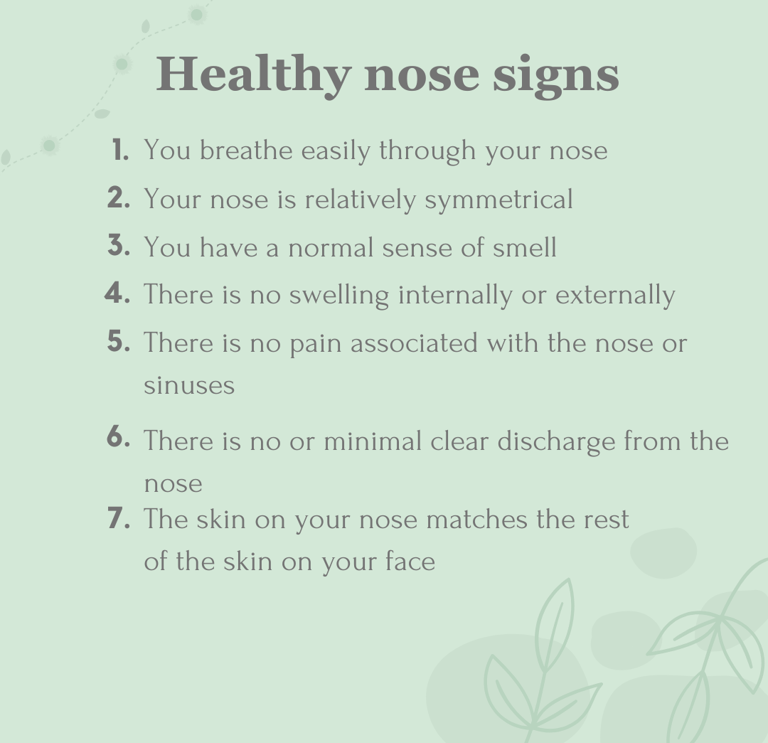

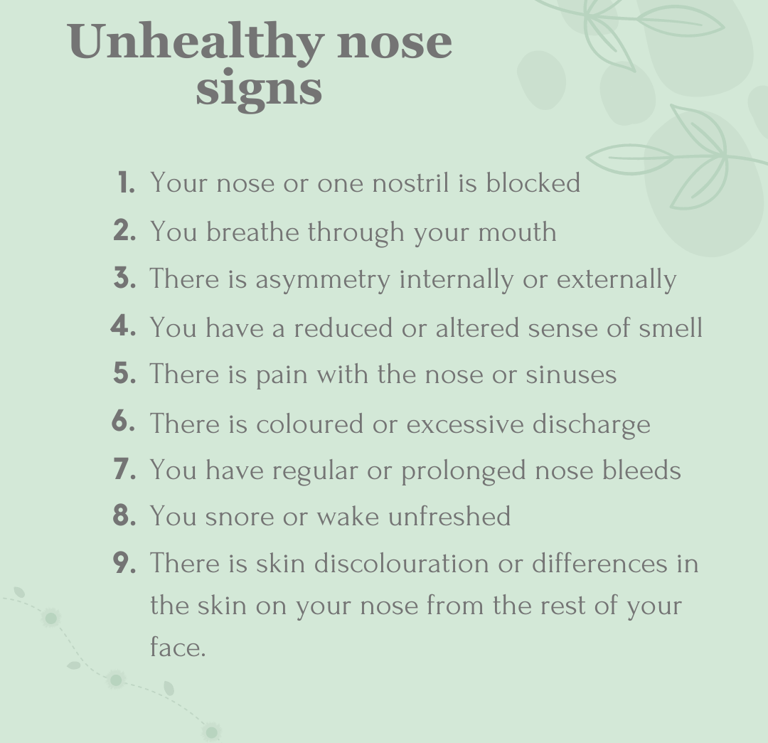

Nose signs and symptoms can indicate that the nose may not be at its healthiest. Not all nose symptoms point to something severe, however, all symptoms or signs should be investigated to have conditions ruled out if they are ongoing. Some nasal symptoms are acute and not long lasting, such as a blocked nose during a cold. These are not a concern so long as they resolve with the illness or are not causing intense pain. If you have any signs or symptoms you are concerned about, please have these investigated by a doctor or ENT.
Some symptoms related to the nose include:
Runny nose
Blocked nose
Sinus pain
Headaches
Inability to breathe through the nose
Asymmetry of the nose
Snoring
Postnasal drip
Watery eyes
Altered sense of smell
Pain in the nose or sinuses
Green/yellow mucus
Frequent nose bleeds
Frequent sneezing
Nose diseases and disorders
Not all of the following disease and disorders affect only the nose and many are impacted by other factors other than just the nose. Some symptoms that impact the nose are caused by diseases and disorders that involve other body systems.
Sinusitis - acute or chronic
Sinus infections
Nasal Polyps
Allergic Rhinitis - allergies or hayfever
Deviated Septum
Nose bleeds
Nasal tumours
Nasal infections
Nasal fractures
Cerebrospinal fluid leaks
Obstructive sleep apnea
Olfactory loss
Mast cell activation syndrome
Viral, bacterial or fungal infections
Nutrition for nose health
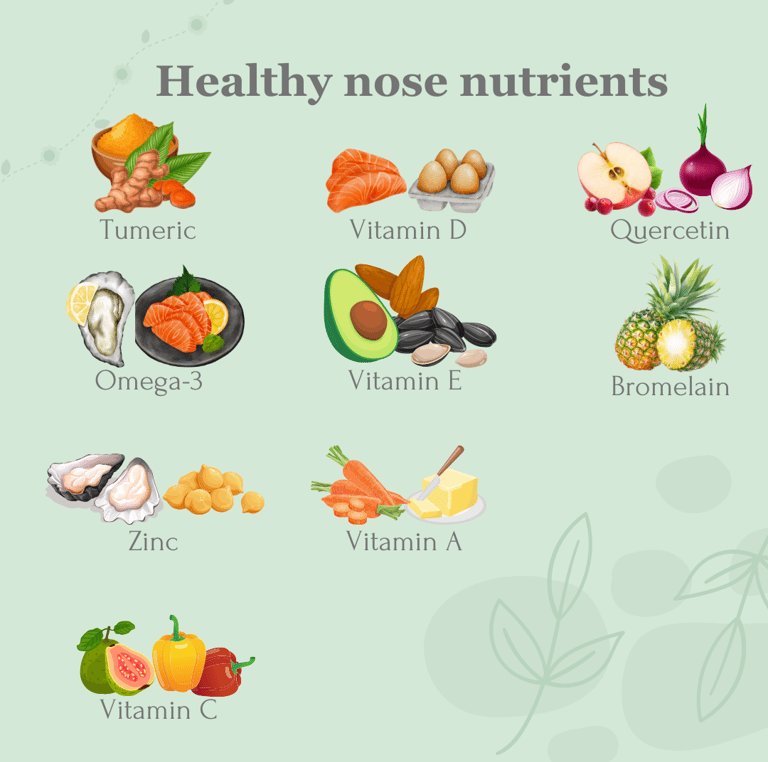

Nutrition can play an important role in optimizing nose health and supporting nasal function, as well as aiding in symptom management or improvement in some nasal conditions. The nutrients and food listed here is general advice for supporting nose health. It is always best practice to include wholefood sources of these foods over supplements. Wholefood sources often have other nutrients that aid in absorption or benefit the recommended nutrients. Supplements should only be taken under the guidance of a qualified health professional. If you have a specific symptom or condition you would like help with. Please consult a qualified health professional. If you would like to see if I can help you, please either book a discovery call or email me.
Turmeric: Turmeric contains a natural anti-inflammatory compound known as curcumin. On top of the curcumin's impacts on inflammation, it also has immune modulating and antioxidant effects. Studies have shown turmeric and curcumin to be effective in reducing hayfever, sneezing, congestion and nasal inflammation. This may be beneficial in sinusitis, nasal polyps, colds/viruses, hayfever and allergies.
Vitamin D: Vitamin D plays important roles in immune modulation, including in both innate and adaptive immunity. It is also anti-inflammatory. Vitamin D deficiency is associated with higher levels of viral infection, inflammation, sinusitis, allergies and nasal polyps. Vitamin D has been shown to help reduce nasal polyp proliferation, reduce rates of influenzas infections and recurrent respiratory infections.
Food sources: Eggs, Cod Liver Oil, Salmon, Tuna, Mackeral, Beef Liver, Mushrooms.
Quercetin: Quercetin is a flavonoid that is found in plants. It works to reduce oxidative damage via it's strong antioxidant properties. Quercetin is great for allergies and hayfever as it helps to stablize mast cells, reducing histamine production. It also helps with immune function by helping zinc to move into cells and enhancing the function of Vitamin C. Due to quercetin's anti-inflammatory properties, it may also play a role in reducing sinusitis.
Food sources: Onions, Red Apples, Berries, Broccoli, Buckwheat, Almonds, Tomatoes, Grapes.
Omega-3: Omega-3s are essential fatty acids that provide strong anti-inflammatory properties. Omega-3 can help in the production of prostaglandins, the body’s own anti-inflammatories.Omega-3s are also immune-modulators and anti-allergy via their ability to inhibit histamine release from mast cells. Omega-3’s may provide support in reducing polyp formation, allergies & hayfever, and inflammation of the nose.
Food sources: Salmon, Mackerel, Tuna, Herring, Sardines, Cod Liver Oil, Oysters, Anchovies, Caviar, Flaxseeds (ALA), Chia Seeds (ALA), Walnuts (ALA), Soybeans (ALA). Small amounts from: Organic pasture raised eggs, grass feed meat
Vitamin E: Vitamin E is a wonderful anti-inflammatory, antioxidant, and it has strong immune supportive properties. Vitamin E can lower IgE concentrations are reduce allergic responses. Deficiency of Vitamin E has also been associated with higher levels of allergic rhinitis. Vitamin E may be helpful in allergies and hayfever, congestion and nasal dryness.
Food sources: Sunflower seeds, Almonds, Peanuts + Peanut Butter, Avocados, Spinach, Kiwi Fruit, Salmon and Pumpkin.
Bromelain: Bromelain is an enzyme that helps to breakdown protein and is therefore often used as a digestive enzyme. However, bromelain is also very beneficial in nasal health as it can help to break up mucus and reduce congestion. Bromelain is also a good anti-inflammatory and can modulate important immune factors, including macrophages. This can be beneficial with allergies or hayfever, sinusitis or other inflammatory pathologies of the nose. Bromelain should not be taken as a supplement if you have a blood disorder or are on blood thinning medication without consultation with a health professional first.
Food sources: Pineapples.
Zinc: Zinc plays important roles in immune and respiratory health and function. Zinc is has antioxidant roles and reduces damage caused by oxidative stress. Zinc may play important roles in protecting nasal mucosal epithelium as deficiency is linked to damage to the mucosal barrier. Deficiency is also linked to nasal polyps and allergies.
Food sources: Oysters, Beef, Oats, Pumpkin Seeds, Turkey Breast, Legumes, Cashews, Cheese, Dark chocolate.
Vitamin A: Vitamin A is beneficial for immune health. It is also vital for healthy mucus membranes and even acts a mucus membrane conditioner. This can be very beneficial if you experience nasal dryness given the nasal and sinus cavities are lined with a mucus membrane covering. The mucus membrane layering is important to keep healthy as it plays a role in keeping the nose healthy and trapping dirt, toxins and dust in the nose so they do not travel to the lungs. There is evidence that Vitamin A may even help with sense of smell dysfunction.
Food sources: Beef Liver, Sweet Potato, Carrots, Lamb Liver, Cod Liver Oil, Salmon, Butter, Eggs and Whole Milk.
Vitamin C: It is common to hear “take Vitamin C to prevent colds!”. This is because Vitamin C is a potent antioxidant, anti-inflammatory and anti-allergy vitamin! Vitamin C also helps to regenerate glutathione, which helps to prevent oxidative damage in nasal tissues. Vitamin C is also beneficial for allergies and hayfever by reducing the amount of histamine the body produces.
Food sources: Kakadu Plums, Capsicum, Guava, Rockmelon, Kiwi Fruit, Kale, Papaya, Broccoli, Strawberries and Oranges.
Lifestyle for nose health
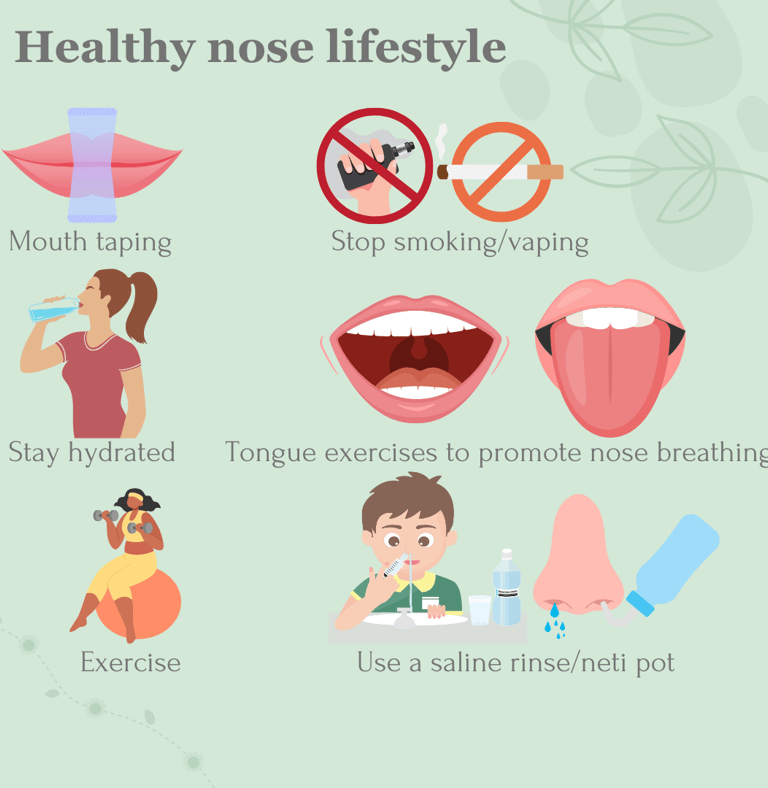

Like nutrition, lifestyle factors also greatly contribute to your nose health and functioning. These lifestyle tips can take some time to implement and create the habit, so go slowly and implement the ones that work best for you or feel achievable at the moment. This is not an exhaustive list of lifestyle habits to support nasal health, but it is a good place to start.
Mouth taping: Mouth taping can sound very scary. It is not as dramatic as it sounds. It simply is a tiny strip of micropore tape that holds your lips closed. You do not cover the entirety of your lips. You do a small vertical strip, like shown in the picture above. There are also specific mouth taping tapes you can buy now, however, micropore tape works just as well. Mouth taping is used to help promote nasal breathing. If done properly, you can actually still breathe through your mouth if you cannot breathe through your nose. There are many reasons we want to promote nasal breathing over mouth breathing, most we cannot explore today, but I would highly encourage you to check out Dr Steven Lin for an in depth discussion in to this area. Nasal breathing is important as it warms, moistens and removing dirt/dust/toxins from the air before delivering it to the lungs. Nasal breathing also helps deliver oxygen to areas of the body better as the nasal sinuses produce nitric oxide when we breathe in through the nose. When we breathe in through the mouth, we do not get clean, warm air into the lungs, nor do we produce nitric oxide. Nitric oxide production in the nose is important for reducing congestion and acts as a defence against pathogens.
Stop smoking or vaping: Smoking or vaping is well known to have toxic health effects, lets look at how it impacts our nasal health. Smokers are at an increased risk of sinusitis and other infections as smoking can cause the hair like structures (cilia) in the nose to stop working and filtering the air we breathe. Congestion is also more likely as the mucus can no longer travel out of the sinuses and nose due to these dysfunctional cilia. Inhaling smoking is irritating and toxic to the airways and as a result, more mucus is produced in response. Smoking can also lead to a loss or decreased sense of smell and a higher incidence of nose and sinus cancers. Stopping smoking or vaping can reduce your risk of nasal health complications and overtime can restore your normal nasal health functioning.
Stay hydrated: Again, something we all know we should be doing for better general health, but staying hydrated has many benefits for our nasal health too. Staying hydrated can help keep nasal membranes moist and prevent or reduce symptoms of dry nose. Staying hydrated can also help with sinusitis or congestion as adequate hydration helps to thin mucus, allowing it to drain out.
Tongue exercises: Tongue position is actually a key sign of whether you breathe through your mouth or through your nose. This is because your tongue position supports your airways. If your tongue is sitting low in your mouth or on the bottom, behind your lower teeth, than you likely breathe through your mouth more often. Your tongue should actually sit on the roof of your mouth just behind your top teeth. We learnt a little bit about why nasal breathing is beneficial and the good news is you can train your tongue to sit to the roof of your mouth if it doesn’t do it already. Dr Steven Lin has some really good tongue exercises you can do to support your airways and nasal breathing here.
Exercise: Exercise is a great way to improve and increase blood flow to different areas of the body, including the nose and sinuses. Exercise can help reduce congestion by increasing blood and oxygen to the nose and opening up the airway passages. Light exercise is recommended. Try walking, jogging, strength training, pilates or yoga. Exercise should only be done at your own pace and should not be continued if you experience shortness of breath, pain, dizziness or pressure in your head.
Use a saline rinse: Saline rinses are an ayurvedic practice that have been used for thousands of years. A saline rinse can be very helpful for those who experience nasal symptoms. Saline rinses can help clear our mucus, keep the nasal membranes moist, remove dust, dirt and other trapped toxins, and it can be useful to help break up and loosen thickened, hard mucus, which may be easier to expel by blowing your nose. Saline rinse solutions can be bought or made. A simple recipe can be found here.
This advice is general in nature and is intended for informational purposes only. This advice does not consider your personal circumstances and should not be used as a substitute to personal professional medical advice. If you are concerned about any signs or symptoms you are experiencing, please see a qualified health professional. If you would like personal nutritional and lifestyle advice, please book an appointment. If you choose to rely on any information provided on this site, you do so solely at your own risk.
References
https://www.uofmhealth.org/conditions-treatments/ear-nose-throat/sinus
https://www.europeanreview.org/wp/wp-content/uploads/39-43.pdf
https://www.annallergy.org/article/S1081-1206(10)61432-9/fulltext
https://www.sciencedirect.com/science/article/pii/S2213398420301755
https://www.pristyncare.com/blog/supplements-that-treat-sinus-problems-pc0135/#Vitamin_A
https://www.everydayhealth.com/ear-nose-throat/sinuses-and-smoking.aspx
https://www.drstevenlin.com/reasons-snoring-sleeping-with-mouth-open/
https://www.health.harvard.edu/diseases-and-conditions/what_to_do_about_sinusitis
https://advancedsinusreliefcenters.com/exercises-for-sinuses-tips-faqs/
Let's talk
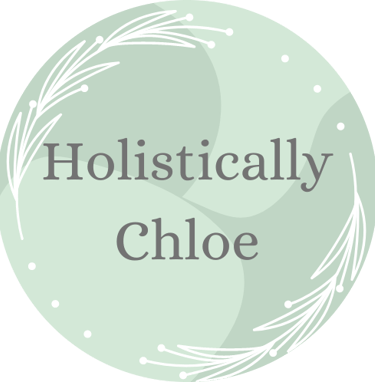

Holistically Chloe would like to acknowledge the traditional owners of the land throughout Australia. We acknowledge the Bunurong people, the traditional custodians of land we gather on today. We pay our respect to elders past and present and extend that respect to all Aboriginal and Torres Strait Islander peoples today.
© Holistically Chloe
